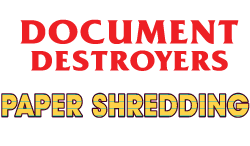Compliance
If your business is found to be in noncompliance it could suffer civil penalties and injunctions. Let Document Destroyers help you to remain compliant with State of Montana and US Federal regulations.
HIPAA
What is HIPAA?
Passed in August 1996, The Health Insurance Portability and Accountability Act (HIPAA) was established as a U.S law in which two main intentions were derived from:
- Standardizing electronic data exchange, in an effort to increase overall efficiency in the healthcare industry
- Enforcing secure, internal procedures to protect the confidentiality of patient information.
What Does HIPAA Ensure?
As outlined under HIPAA, Healthcare facilities must adhere to specific standards when it comes to maintaining, sharing, and storing electronic patient health as well as financial and administrative data. Shredding sensitive documents prior to disposal is a key factor in HIPAA compliance.
Essentially, regulations outlined under HIPAA, help to protect the privacy and integrity of individuals past, present, and future health information.
Who Must Comply with HIPAA?
Nearly all Healthcare Organizations, including healthcare providers, public health authorities, healthcare clearinghouses, and self-ensured employers. In addition, nursing homes, private practices, and universities are also to remain in compliance with laws outlined under HIPAA.
FACTA & Red Flags Rule
What is FACTA?
The Fair and Accurate Credit Transaction Act (FACTA) was established in November 2003, in order to protect consumers from the threat of identity theft and consumer fraud. As a means increasing accuracy and privacy, it states that all consumer content must be securely destroyed, prior to disposal.
What Does FACTA Ensure?
The introduction of FACTA’s disposal rule makes document shredding a necessary step in preventing identity theft. Shredding vital information prior to disposal has always been encouraged; however, FACTA’s security law now makes it an obligatory practice in protecting consumer identity. The law makes document shredding a necessity for companies of any size, as well as individuals who employ even one person.
What is The Red Flags Rule?
Enforced by The Federal Trade Commission (FTC), this rule requires Financial Institutions and Creditors to implement a written identity theft prevention program for the purpose of spotting any “red flags” of identity theft in their daily business operations. Organizations are to take the necessary steps to prevent the crime, and reduce its damage. Essentially this program can assist businesses in spotting skeptical patterns that indicate identity theft, acknowledging it before it becomes a costly issue.
Due to the complexity involved in remaining compliant, the Red Flags Rule provides guidelines to assist Financial Institutions/Creditors in creating and implementing an appropriate program.
What Does the Gramm-Leach-Bliley Act Refer to?
The GLBA requires that Financial Institutions and Banks throughout the U.S safeguard the privacy and confidentiality of customer information. This must be executed through a written information security plan that is fitting for the institution’s size and complexity, as well as the degree of sensitive information present. All confidential documents such as financial records and other customer information should be shred prior to disposal, so details cannot be read or reconstructed.
FTC and Paper Shredding
It is estimated by The US Federal Trade Commission that approximately 9 million cases of identity theft occur every year in the U.S, alone. In an effort to combat this rising issue, the FTC strongly recommends that residents and businesses protect themselves against identity theft by shredding all sensitive documents before disposal. Implementing smart disposal practices and providing shred bins throughout your workplace, will encourage staff to discard their documents appropriately and safely.
